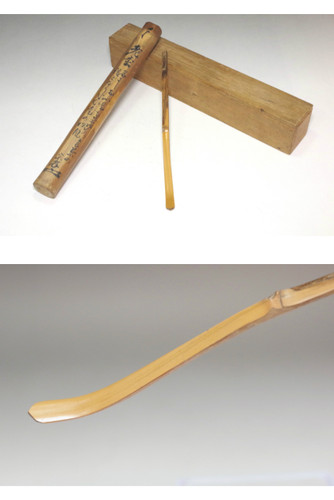Sen Soha (1670-1689) Antique 'Chashaku' bamboo tea spoon #4816
- SKU:
- 4816
- Shipping:
- Free Shipping
- length: approx. 19.8cm (7 51⁄64in)
- weight: total 91g
- the box says that the title is Old pain. Sorry but, we were unable to decipher the poem.
Sen Soha
Son of Sen Soza, the fifth generation of Omotesenke. He learned the tea ceremony from his father.
Chashaku, tea scoop, was originally a scoopula, dispensing scoop, which had been used in China. Many of them were metal made ones and had a taro's leaf like form scoop with a handle whose top was a ball like form to crush Chinese herb with it. Meanwhile, in Japan, people used chashaku as a tool to put powdered green tea into tea bowl.
At the end of Muromachi period, however, the tea ceremony was founded, and the ceremony's style in which host sit in company with the guest(s) in the same room and made tea in front of the guest(s) began. The host spooned up powdered green tea out of bottle, which was made of wood and kept the powder. Then chashaku made of metal did not suit for the use because it may damage the bottle and spooning up powders out of the bottle was difficult because of the chashaku's wide scoop. Therefore, Shutoku, a disciple of Juko Murata(1422-1502) developed his original wooden lacquered chashaku, whose shape was suitable for satisfying the condition. It was called "Shutoku-gata".
After that, bamboo made chashaku was developed. It was used as a disposal, single use tool.
Since the era of Rikyu, however, people began to put it back into a hollow bamboo utensil. In addition, people began to decorate the bamboo utensil with a stylized signature. At this point, people got to love a combination beauty of a chashaku and a hollow bamboo utensil. As time goes by, many tea experts have made hand-made bamboo chashakus and various chashakus has been made to love the shape of them as well as today.












